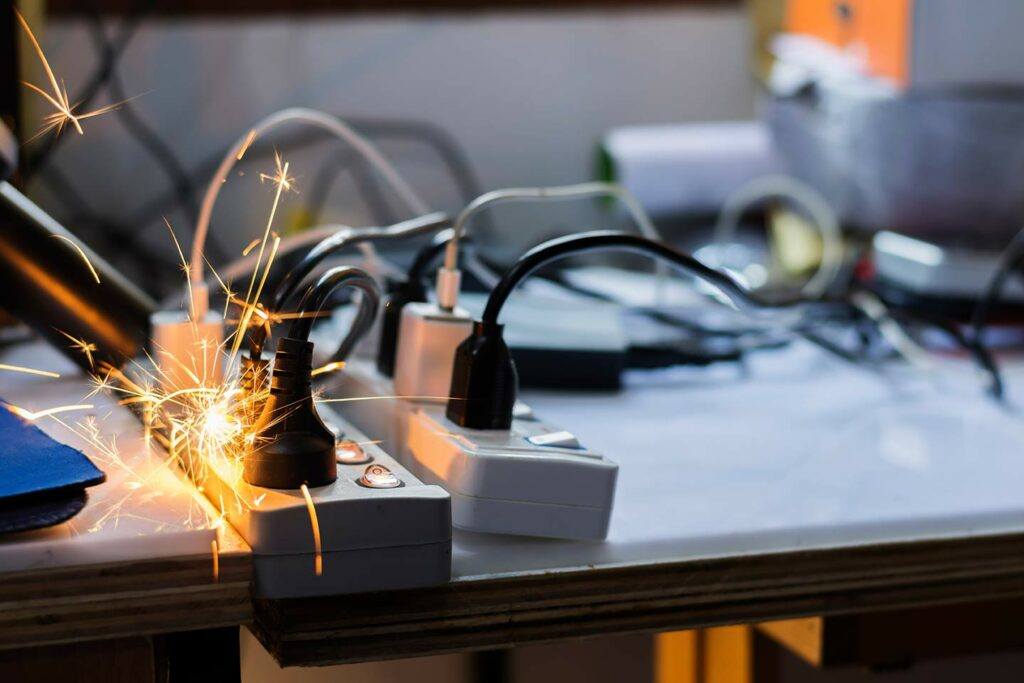Every time you flip a light switch, use a computer, or run a machine, you’re relying on the electricity of your building to keep everything safely operating. It can be easy to take that for granted. If you’re experiencing electrical issues in your commercial building, they can quickly go from annoying to crippling, if not dealt with swiftly. They can even become a fire hazard. In this article, you’ll learn about the most common electrical issues in commercial buildings, and how to ensure optimal electrical safety of your commercial property.
Warning Signs of Electrical Issues in a Commercial Building
In addition to routine electrical inspections, being aware of the warning signs of issues can help you know when it might be time to call in an electrician right away. These signs of electrical issues in commercial buildings include:
- Lights flicker, dim, or burn out faster
- Breakers trip often
- Electronics fail suddenly and more often
- Outlets that spark, have black residue, are generating heat, or are dead
7 Common Commercial Electrical Issues
The warning signs listed above don’t necessarily have all the same causes. For instance, you may have problems with your outlets or lighting that can be traced back to more than one failure in your electrical system. This is why it’s important to contact a professional commercial electrician to get to the root cause. Listed below are the most common electrical problems found in commercial buildings.
1. Overloaded Circuit Breakers
Your circuit breakers are like a safety switch responsible for interrupting the flow of electricity in your electrical panel when something is wrong. They last for decades, but they can get damaged by arcing or surges, or fail from age. In addition, having too many appliances or machines on one circuit can overload it. Overburdening a circuit can result in a fire in the wiring or electrical panel or both. You can add more circuit breakers, but adding more than the panel was designed to accommodate can be very dangerous. If your building’s electrical needs have outgrown the original electrical panel, it may be time to have a new electrical panel installed.
2. Disorganized or Mislabeled Electrical Panels
A disorganized or mislabeled electrical panel can be annoying at best and dangerous at worst. When replacing an outlet or light switch, the last thing you want to have to do is use the process of elimination to find the right circuit to turn off. Mislabeled and illegible labels are all too common in commercial buildings, and can be incredibly frustrating, as well as safety hazard. It’s possible for outlets and fixtures in the same room to be connected to different circuits. If not labeled clearly in your electrical panel, it can be impossible to know if the power to everything is turned off and safe to handle or not.
3. Outdated, Crowded, or Faulty Wiring
One of the most common electrical issues in commercial buildings, especially older ones, is outdated, or faulty wiring. Unless you’re the electrician who installed the wiring in your building, you have no idea what shape it’s in without an electrical inspection. Wiring that was installed incorrectly, not properly grounded, or insufficiently spaced poses a danger and can cause electrical fires. Other common wiring issues in commercial buildings that increase your risk of fire include degradation from age and damage from pests.
4. Older Outlets
Outlets in active commercial buildings take quite a beating, and are in high demand. So it’s common for many businesses to use power strips and extension cords to make up for a lack of available outlets. However, extension cords are not meant to replace outlets, and should only be used as a temporary solution. Extension cords can overheat and cause fires, and appliances can be adversely affected by their continued use. Older commercial buildings may also have ungrounded outlets, which should be replaced with grounded (three-pronged) ones. There may also be locations in and around the building that warrant GFI outlets (Ground Fault Interruption) for optimal electrical safety. Installing more outlets in a commercial building is a quick and easy job for a professional electrician and could save your building’s entire electrical system in the long run.
5. Grounding Problems
Proper grounding protects anything hardwired into your building’s electrical system and anything plugged into an outlet from surges. It ensures that excess energy that could damage electronics or produce sparks is discharged safely. The most common grounding problem that occurs in commercial buildings is called ground loops. This typically occurs when an electrical system is connected to the ground wire at more than one point, closing the loop instead allowing the energy to be safely shed.
6. Improper Installation of Hard-Wired Machinery or Appliances
Anytime your building needs an appliance installed that doesn’t just plug into an outlet, it’s time to call an electrician. An improperly installed, hard-wired appliance, such as a dishwasher, overhead fan, or electrical vehicle charging station can result in a number of issues, from poor performance to fire or electrocution.
7. Loose or Unprotected Connections
Discovering that an electrical issues in a commercial building was just a loose connection can be a relief, because it’s easier to fix. However, not discovering the loose connection can spell disaster. And finding it may not be so easy. In addition, connections that are properly capped can become loose.
Contact Schafer Electric for a Commercial Electrical Safety Inspection
Routine electrical inspection for commercial buildings ensures any problems are detected before you even know you have them. At Schafer Electric, we have been providing commercial electrical services to businesses in Sonoma, Marin, and Napa counties for more than a decade.
The certified commercial electricians at Schafer Electrical are here to answer any of your electrical questions. Contact our team online today, or call us at 707-545-3300, to schedule a comprehensive commercial electrical inspection for your business.


No comments yet. Add the first comment